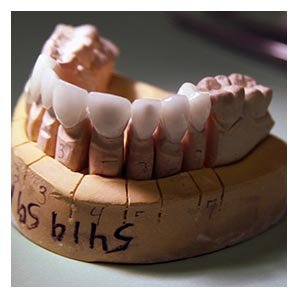According to the American Dental Association, a dental implant is “a device specially designed to be placed surgically within or on the mandibular or maxillary bone as a means of providing for dental replacement” . In essence a dental implant provides a permanent means to replace missing teeth in the oral cavity. These implants can be placed in either the front or back of the mouth to serve the purpose of enhancing your smile or improving masticatory ( chewing ) forces. A dental implant is made of a titanium biocompatible material that becomes integrated within your natural bone. Once integrated, the dental implant must be maintained with proper oral hygiene in order to last a lifetime.
Dental Implants
What are Dental Implants?
Learn how to dental implants can be beneficial to many different patients . . .
Steps to Receive Dental Implants

- Visit our office in order to obtain an implant consultation. A thorough examination of the mouth will allow us to evaluate the space provided. The dentists will analyze whether you are a suitable candidate for implant placement. If not, we will provide alternatives including but not limited to bridge placement & removable prosthetics (dentures). After, we will direct you to a list of recommended implant surgeons within San Diego County.
- Surgery Consultation – At the surgery consultation, you can expect to have a more detailed examination of the supporting bone, space allotted for implants as well any other variable that may indicate or contraindicate implant placement. The surgeon may take more thorough images to evaluate the implant site & assure a more predictable outcome.
- Implant Surgery – Under anesthesia, the surgeon will place the biocompatible implant with care into the supporting bone structure in the upper or lower jaw. Depending on the surgical case, the patient may leave with or without a temporary crown.
- Implant Impression & Implant Crown Delivery – After an adequate healing period, the dentist will take an impression of the implant site and deliver the impression to the dental laboratory where a dental crown will be fabricated that matches the other teeth in your mouth. This will provide for a natural smile.
Implants FAQS
Can Implant Support my Dentures:
Removable Partial/ Complete Dentures rely on the supporting bone/ tissue to provide for stability, support & retention. However, some individuals do not have the proper anatomical structure to allow for highly functional dentures. Implants allow dentures to lock into place and provide for a means that allow the dentures to remain stable in the mouth through chewing forces & everyday forces that can allow for dislocation.
How much do dental implants cost?
The fee associated with dental implants is dependent on a variety of variables including but not limited to: # of appointments, # of implants, Imaging, Type of Implant Case. Unfortunately, these variables can vary the price extensively. A dental consultation will provide a better outlook on the fees necessary.
How long will it take to receive my implant supported crown?
As mentioned above, every implant case has a variety of variable with treatment including surgical and dental considerations. Some cases last a couple of months while others may last over a year. The treatment time is dependent on the patient’s expectations, the quality of bone, the technique provided as well as the material used. The dentist and implant surgeon will work with your expectations to provide treatment that can be coordinated with your everyday life.
What are the risks of dental implants?
Any type of surgery has a certain amount or risks associated with it. Dental implants have been proven to be safe and effective. Implant surgery has revolutionized the way we replace teeth in dentistry & offers a permanent solution.
Complications from dental implant surgery may include: Sinus Problems, Nerve Damage, Implant Failure, Infection…etc. However, the dentist & implant surgeon take extensive measures to avoid these problems through extensive imaging and analysis of the jawbone in the associated implant site. The surgeon will go over each risk before implant placement.
What are the benefits of dental implants?
- Protect healthy bone structure. Spaces between teeth lead to a variety of problems throughout an individuals lifetime. Teeth follow the path of least resistance; thus, adjacent & opposing teeth slowly drift into the space allotted over time. This will lead to misaligned teeth that may affect the way ones teeth come together over time. In addition, jawbone can deteriorate if not stimulated throughout one’s lifetime. The dental implant provides a stress ot the bone which can counteract bone deterioration over time.
- Speech. Spacing between teeth can also affect the way one speaks. Ur natural teeth serve as areas for our tongue to rest on when making certain noises or enunciating certain letters. Thus, replacing the space with an implant can allow some individuals to regain proper speech.
- Chewing. Those that are missing their back teeth likely have problems masticating on certain foods. Our back teeth help us chew food into smaller particles that we can swallow and digest. The front teeth allow us to incise certain food particles. Thus replacing these teeth can restore some of the function that was lost from losing that particular tooth.
- Permanent. Dentures are truly a remarkable advent in dentistry. However, sometimes dentures can be problematic if the anatomical support isn’t there to keep the denture in place throughout the day. If dentures aren’t providing the functional medium needed, consider implants as a way to hold the denture in place in the future.
